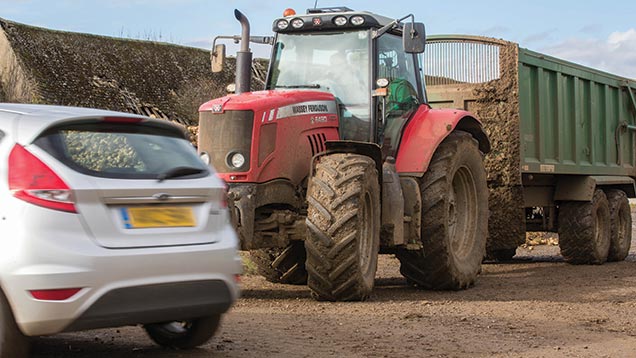Dos and don’ts of driving a tractor on the road
 © Tim Scrivener
© Tim Scrivener An estimated 1% of all road deaths involve tractors, and while these may or may not be the fault of the driver, it is important that all operators take road awareness seriously.
The goldfish bowl of a tractor cab means drivers are under constant scrutiny. Moreover, with the contact information of their employers scribbled all over the tractor bonnet, they are quickly identified, too.
To improve and protect the image and reputation of the contracting industry, particularly as vehicle weights have increased to 31t and the industry is lobbying to go heavier, the NAAC encourages employers to enforce the rules.
See also: Road rules reminder: Trailer safety, tractor speed and licences
No phones
It is illegal to use a mobile hand-held phone or hold a sat nav when driving on the road, even if you are stopped in traffic or at lights.
The penalty could be six licence points and £200 spot fine, but you could even be disqualified from driving and the bill could hit £1,000.
If you are involved in an accident because of mobile phone use then the consequences are likely to be far more serious.
Driving licences
As everyone scrabbles to find suitable extra staff for the coming harvest, many contractors will be employing young drivers.
While the reputation of young drivers may often come under scrutiny, many tractor operators, particularly with an agricultural background, have plenty of driving experience off-road.
However, 16-year-olds must first pass a category-F test to be licensed on the road.
The test includes instructor observations during different manoeuvres, Highway Code theory questions and an eyesight test.
Assuming the driver passes at age 16, the category-F test will only allow them to drive tractors less than 2.45m wide, with a trailer less than 2.45m wide, with two wheels or four close-coupled. Realistically this usually includes tractors of about 150hp or less.
If your driver has waited an extra year, at 17 they can legally drive an agricultural tractor on the road once they have passed a car category-B test.
And while newly qualified young car drivers wanting to tow a trailer weighing more than 750kg behind their car need to pass a B and E test (when the combined weight of the towing vehicle and trailer is more than 3,500kg), they are still legally allowed to drive an agricultural tractor and trailer up to a 31t combined weight on the roads under a category-B licence.
Tracked vehicles are slightly different and cannot automatically be driven on a B-category licence alone.
Drivers need to take an additional H test and at age 17-20 the maximum authorised mass (MAM) of the vehicle cannot be more than 3,500kg.
However, at age 21, the H-category licence covers all tracked vehicles.
You can find more information on tractors and regulatory requirements on the government website.
Insurance
Always check with your insurance company that correct cover is in place for young drivers.
This is particularly important if 13- to 16-year-olds are driving tractors off-road, and you should not just assume that cover is in place.
Specific off-road driving courses for 13- to 16-year-olds should be undertaken to make sure young drivers are able to use the tractor safely and with confidence, and that the key fundamentals of driving, loading and health and safety are properly understood.

